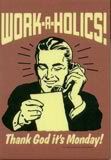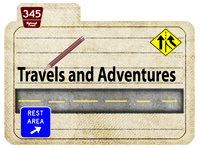
(Here's one group you'll never see me joining.)
Workaholics struggle to say "No"
to work By Ellen Wulfhorst
NEW YORK (Reuters) - Sam used to sneak into his office before dawn so no one would know how many extra hours he worked. Charles goes on all-night work binges to meet deadlines, and Susan can't say no to volunteer projects, social clubs, bridge games, choral singing, lectures and classes.
Each one is a member of Workaholics Anonymous, a 12-step recovery program for compulsive workers based upon the structure of Alcoholics Anonymous. Each one opted to keep their identity secret.
"It's been called the addiction that society applauds," said Mike, a physician and member of the group known as WA.
"People brag about it and say, 'I'm a workaholic,'" he said. "But workaholics burn out and then you've lost them or they become very dysfunctional and bitter and cynical in the organization and corrosive."
Workaholics Anonymous keeps no central count of members, but organizers estimate dozens of weekly meetings are held in the United States as well as in Germany, Switzerland, Austria and Britain. The group also sells about 100 books about WA a month via its Web site, according to organizers.
WA's roots go back to 1983, when a New York corporate financial planner and a school teacher founded a group based on AA but designed to fight compulsive working.
WA identifies workaholics as people who often are perfectionists and worriers, derive their self esteem from work, keep overly busy, neglect their health, postpone vacations and overschedule their lives.
Workaholics don't even have to have a job; they can just be compulsively busy as they seek an adrenaline high, to overcome feelings of inadequacy and low self esteem and to avoid intimacy, it says.
DESTROYING LIVES
The weekly meeting in New York draws an average of a half dozen people in a city that might be considered a hotbed of workaholism. Such meager attendance invites the predictable joke that most workaholics are too busy to attend meetings, a quip that organizer Charles has heard a million times.
"People think it's funny," he said. "It's amusing until you hear the stories. There have been many people who have come, and work is destroying their lives."
Unlike alcoholics, who can measure recovery by their days of sobriety, workaholics have no quantifiable gauge of their problem, or their recovery.
"In my case, my boss was telling me I had to get my work hours down to 40 a week, and I couldn't do it," said Sam, a former senior project engineer in California's Silicon Valley.
"I was sneaking into work at 5 a.m. on a Sunday so I could get work done and be out of the place before anyone else showed up," he said. "I didn't want people to see how much time I was putting in.
"Now I'm more willing to try to do a mediocre job and keep my own mental health and sanity than to do the perfect job on everything I attempt," he said.
Like AA, WA uses a 12-step program for recovery from addiction. At meetings, members share their experiences and study the organization's literature and guidelines.
"It really forces you to look inside and say, 'What's really going on with me?'" said Charles. "A lot of people don't want to do that."
Even if workaholism is hard to define, you know it when you feel it, said Mike, who has left his high-pressure urban job for work at a rural clinic where cows wander outside.
"After a while one gets a feeling of what driven, compulsive working feels like," he said. "There's a tightness to it. There's a lot of adrenaline surging. There's a lot of worry.
"There's a lot of preoccupation, which is different from just waking up in the morning and saying, 'Wow, I really love what I do'," he said.

 My other blogs:
My other blogs:

































No comments:
Post a Comment